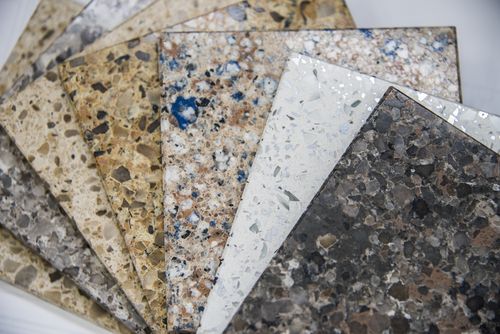Vinegar seems to be the top product for natural-based cleaning. This acidic solution is effective at cleaning a wide range of household messes, but don't be fooled into thinking it is safe for everything.
The power of vinegar is too much to handle in certain situations. Follow these helpful tips to see where you shouldn't use vinegar in your home.
Advertisement
1. Don't use it to pick up a broken egg
You've dropped an egg, so your natural response is to reach for your bottle of vinegar-based cleaning spray. The acid in vinegar reacts to raw egg to form a gluey mess that is almost impossible to clean up. Instead of vinegar, wipe up the egg with a warm, soapy dishcloth.

Shutterstock
2. Don't use it on natural stone
Granite, marble, soapstone and other natural stone surfaces should never be cleaned with any acid-based cleaner. The acid in vinegar can finely etch the surface over time and make it susceptible to staining and other damage. Polished stone surfaces lose their shine from being cleaned with vinegar. Only use cleaners designated for use on natural stone surfaces.

Shutterstock
3. Don't use it on waxed surfaces
Waxed surfaces require gentle cleaners. Your furniture, flooring and even your car need a protectant layer of wax to ward off the harmful effects of the environment. The acid in vinegar can strip this wax over time and expose your item to damage.

Shutterstock
4. Don't clean your iron with vinegar
Although you've been told to clean mineral deposit with vinegar, using it in your iron as a cleaning solution is a huge no-no. The vinegar can actually damage the internal parts of the iron. Your best bet at keeping your iron reservoir clean is to keep it drained between uses.

Shutterstock
5. Don't clean unsealed grout
Unsealed grout is similar to natural stone. Without the sealant to protect the grout, the natural acids in vinegar penetrate into the grout. Over time the grout begins to crumble or dissolve. If your tile features sealed grout, use vinegar with caution to make sure the seal is in good shape prior to use.

Shutterstock
6. Don't use vinegar on your electronics
Vinegar is too acidic for many surfaces. Computer, tablet and phone screens all have protective coatings that can be damaged by acid-based cleaners. Rubbing alcohol and water mixtures are the safest cleaners for your expensive electronics.

Shutterstock
7. Solid wood furniture
Vinegar can ruin certain types of wood finishes. Instead, opt for a wood cleaner that is suited to the type of wood you have.

Shutterstock
8. Dishwasher
The acetic acid of vinegar can actually eat away at the rubber material in the dishwasher. Instead, opt for dishwasher cleaners such as Finish or Affresh to remove hard water stains and film.

Shutterstock
9. Kitchen knives
Keep vinegar away from metals found in kitchen knives. If you want to keep your knives looking new, simply use dish soap and warm water. Vinegar can leave the knife's edge pitted and also cause damage to the overall finish.
Advertisement

Shutterstock

